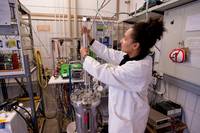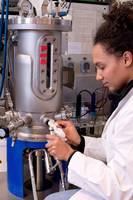Flavia Neddermeyer has received the “Best Oral Presentation Award” at the ADCHEM Symposium in Canada.
Flavia Neddermeyer, PhD candidate in the UniCat group of Prof. Rudibert King, was honored with the “Best Oral Presentation Award” for her presentation “Model-Based Control to Maximise Biomass and PHB in the Autotrophic Cultivation of Ralstonia eutropha” at the ninth International Symposium on “Advanced Control of Chemical Processes” (ADCHEM 2015). Co-authors of the presentation were Niko Rossner and Prof. Rudibert King. The presentation and corresponding publication concern the model-based control of autotrophic cultivation of the hydrogen-oxidizing bacterium Ralstonia eutropha, which can grow on hydrogen (H2), carbon dioxide (CO2) and oxygen (O2).
“We cultivate Ralstonia eutropha to produce hydrogen-converting enzymes and useful cell components for groups of the UniCat Research Field E3-2,” states Flavia Neddermeyer. “And we are doing so reproducibly at a large scale.” The UniCat groups of Dr. Oliver Lenz, Dr. Patrick Scheerer, Dr. Ingo Zebger, and Prof. Peter Hildebrandt investigate these products using different methods. The ultimate aim is to use these enzymes for energy-related biotechnological processes.
The work done by Neddermeyer is an integral part of UniCat research. The special cultivation of Ralstonia eutropha bacteria produces certain enzymes in great amounts. “These enzymes are oxygen-tolerant hydrogenases, which catalytically convert hydrogen even in the presence of oxygen,” says Dr. Oliver Lenz. “They are of great interest to UniCat as well as in biotechnological application”. These enzymes can split hydrogen into protons and electrons as they also catalyze the reverse reaction, the production of hydrogen. The produced hydrogen can react with oxygen to produce electric energy in bio- fuel cells. As the reverse reaction requires energy, energy from the sun can be stored chemically in the form of hydrogen.
In her honored presentation, Flavia Neddermeyer mainly discusses maximizing biomass and PHB yield. PHB is polyhydroxybutyrate, which serves as energy and nutrient storage in living cells and is also biotechnologically relevant. “Our production process is optimized through model-based control,” says Flavia Neddermeyer. The aim is to maximize the yield of various cellular components.
In order to create the model of the process, the King Group is interested in all large cellular components. In the past, PHB was used industrially in the production of bioplastics. More recently, it is being used as artificial tissue replacement.
From an industrial point of view, biomass is also a relevant product. The production of isotope-labeled biomass components is relatively simple. In this process, Ralstonia eutropha is cultivated, for example, exclusively with labeled carbon dioxide (13CO2), as source of carbon. This is possible because the organism is able to grow autotrophically, i.e. to produce its building blocks using CO2, just like in plants. The energy required for this process is taken from the controlled combustion of hydrogen with oxygen.
Neddermeyers research work resulted in a valid model of the fermentation process, which can be used to maximize the yield of biomass, hydrogenases, and the bioplastic PHB.
Flavia Neddermeyer studied biotechnology at the TU Berlin. She was a research associate at the Hochschule für Technik und Wirtschaft (HTW) Berlin, and joined Prof. King’s research group in June 2013 for a doctorate in the area of measurement and control.
The ADCHEM Symposium takes place every three years and is hosted by the International Federation of Automatic Control (IFAC), a multinational consortium of national member organizations, each of which addresses issues of automation technology in its individual country. The ADCHEM 2015 took place June 7-10 in Whistler, British Colombia, Canada.



